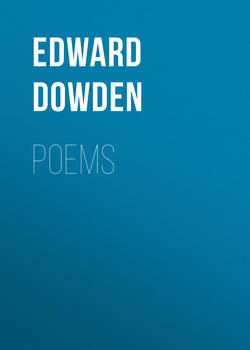Читать книгу Poems - Edward Dowden - Страница 9
IN THE GARDEN
ОглавлениеI. THE GARDEN
Past the town’s clamour is a garden full
Of loneness and old greenery; at noon
When birds are hushed, save one dim cushat’s croon,
A ripen’d silence hangs beneath the cool
Great branches; basking roses dream and drop
A petal, and dream still; and summer’s boon
Of mellow grasses, to be levelled soon
By a dew-drenchèd scythe, will hardly stop
At the uprunning mounds of chestnut trees.
Still let me muse in this rich haunt by day,
And know all night in dusky placidness
It lies beneath the summer, while great ease
Broods in the leaves, and every light wind’s stress
Lifts a faint odour down the verdurous way.
II. VISIONS
Here I am slave of visions. When noon heat
Strikes the red walls, and their environ’d air
Lies steep’d in sun; when not a creature dare
Affront the fervour, from my dim retreat
Where woof of leaves embowers a beechen seat,
With chin on palm, and wide-set eyes I stare,
Beyond the liquid quiver and the glare,
Upon fair shapes that move on silent feet.
Those Three strait-robed, and speechless as they pass,
Come often, touch the lute, nor heed me more
Than birds or shadows heed; that naked child
Is dove-like Psyche slumbering in deep grass;
Sleep, sleep,—he heeds thee not, you Sylvan wild
Munching the russet apple to its core.
III. AN INTERIOR
The grass around my limbs is deep and sweet;
Yonder the house has lost its shadow wholly,
The blinds are dropped, and softly now and slowly
The day flows in and floats; a calm retreat
Of tempered light where fair things fair things meet;
White busts and marble Dian make it holy,
Within a niche hangs Dürer’s Melancholy
Brooding; and, should you enter, there will greet
Your sense with vague allurement effluence faint
Of one magnolia bloom; fair fingers draw
From the piano Chopin’s heart-complaint;
Alone, white-robed she sits; a fierce macaw
On the verandah, proud of plume and paint,
Screams, insolent despot, showing beak and claw.
IV. THE SINGER
“That was the thrush’s last good-night,” I thought,
And heard the soft descent of summer rain
In the drooped garden leaves; but hush! again
The perfect iterance,—freer than unsought
Odours of violets dim in woodland ways,
Deeper than coilèd waters laid a-dream
Below mossed ledges of a shadowy stream,
And faultless as blown roses in June days.
Full-throated singer! art thou thus anew
Voiceful to hear how round thyself alone
The enrichèd silence drops for thy delight
More soft than snow, more sweet than honey-dew?
Now cease: the last faint western streak is gone,
Stir not the blissful quiet of the night.
V. A SUMMER MOON
Queen-moon of this enchanted summer night,
One virgin slave companioning thee,—I lie
Vacant to thy possession as this sky
Conquered and calmed by thy rejoicing might;
Swim down through my heart’s deep, thou dewy bright
Wanderer of heaven, till thought must faint and die,
And I am made all thine inseparably,
Resolved into the dream of thy delight.
Ah no! the place is common for her feet,
Not here, not here,—beyond the amber mist,
And breadths of dusky pine, and shining lawn,
And unstirred lake, and gleaming belts of wheat,
She comes upon her Latmos, and has kissed
The sidelong face of blind Endymion.
VI. A PEACH
If any sense in mortal dust remains
When mine has been refined from flower to flower,
Won from the sun all colours, drunk the shower
And delicate winy dews, and gained the gains
Which elves who sleep in airy bells, a-swing
Through half a summer day, for love bestow,
Then in some warm old garden let me grow
To such a perfect, lush, ambrosian thing
As this. Upon a southward-facing wall
I bask, and feel my juices dimly fed
And mellowing, while my bloom comes golden grey:
Keep the wasps from me! but before I fall
Pluck me, white fingers, and o’er two ripe-red
Girl lips O let me richly swoon away!
VII. EARLY AUTUMN
If while I sit flatter’d by this warm sun
Death came to me, and kissed my mouth and brow,
And eyelids which the warm light hovers through,
I should not count it strange. Being half won
By hours that with a tender sadness run,
Who would not softly lean to lips which woo
In the Earth’s grave speech? Nor could it aught undo
Of Nature’s calm observances begun
Still to be here the idle autumn day.
Pale leaves would circle down, and lie unstirr’d
Where’er they fell; the tired wind hither call
Her gentle fellows; shining beetles stray
Up their green courts; and only yon shy bird
A little bolder grow ere evenfall.
VIII. LATER AUTUMN
This is the year’s despair: some wind last night
Utter’d too soon the irrevocable word,
And the leaves heard it, and the low clouds heard;
So a wan morning dawned of sterile light;
Flowers drooped, or showed a startled face and white;
The cattle cowered, and one disconsolate bird
Chirped a weak note; last came this mist and blurred
The hills, and fed upon the fields like blight.
Ah, why so swift despair! There yet will be
Warm noons, the honey’d leavings of the year,
Hours of rich musing, ripest autumn’s core,
And late-heaped fruit, and falling hedge-berry,
Blossoms in cottage-crofts, and yet, once more,
A song, not less than June’s, fervent and clear.
